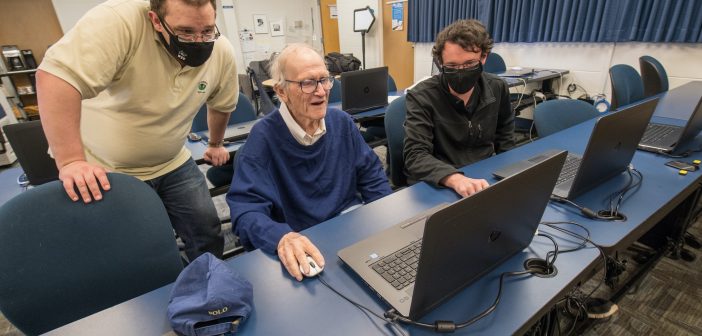By Troy Watkins
The University’s Center for Instructional Technology (CIT) has played an instrumental role in the continuation and advancement of remote learning on campus, especially since the onset of the COVID-19 pandemic.
Early this year, Westfield State was ranked 86th among more than 330 universities recognized nationwide in U.S. News & World Report’s 2021 Best Online Programs list. Having previously earned this accolade, the CIT’s online training staff believes that the most telling indicator lies in the University’s “Faculty Credentials and Training score” (measuring how well an institution prepares qualified instructors to teach remotely). Westfield State received a score of 98 out of 100, the eighth-highest score among all ranked institutions.
CIT staff say the faculty are the key to program and student success, as faculty work diligently to incorporate online best practices into their courses.
The CIT’s commitment to service of the faculty and students is evident across campus.
Directed by Lynn Zayac—who created a pandemic plan and needs assessment prior to COVID-19’s disruption last March—the CIT successfully trained 260 faculty members in online course instruction and transitioned nearly 120 additional courses to an online/hybrid format over the past year. Zayac’s foresight enabled the CIT to adeptly respond to the crisis and complete the spring 2020 semester.
“Westfield State has always been known for the quality of its teaching and for its student-centered culture. The CIT has made us better,” says Education Professor Sandra Berkowitz, Ph.D. “Since the inception of the CIT, Lynn and her talented team have not only supported our instructors in bringing their courses into the 21st century; they have also led us there.”
English major Grace Templeton ’22 relied on the easy-to-use website that CIT offers for online learning resources.
“I had to learn how to use Zoom this past fall for the first time during the pandemic, and the tutorials and training CIT has linked on their website were so helpful,” says Templeton. “I was worried I wouldn’t be up to speed with the other students who had previously become familiar with Zoom during the spring 2020 semester, but thanks to CIT this wasn’t the case.”
“Using the CIT’s PLATO Help Desk on occasion was a lifesaver, as I always had quick responses and feedback to any questions or concerns I had while learning remotely,” says Templeton. “For students like me with a lot on their plate, resources like these can be the deciding factor between succeeding in your classes or falling behind.”
Berkowitz praises CIT’s leadership. “The CIT is not a technology back-up team; they are leaders in virtual and online teaching and learning methodologies,” she says. “I have referred dozens of faculty, both full-time and part-time, and dozens of student teaching supervisors to the CIT. They have never let us down.”
The CIT has grown exponentially since 2007, when only 20 courses were available online, according to Lisa Clark, CIT’s online faculty training specialist. Prior to the pandemic, Westfield State offered more than 1,000 online courses per year. Joe Axenroth has been with the CIT since 2009 and provides PLATO support and administration. The Center welcomed Valerie DePina in 2013, the team’s online training specialist, and is supported by a dedicated group of interns and work-study students. During the pandemic, the CIT team pivoted to training and instruction to meet the overwhelming need to prepare faculty for and support them on the various remote and online delivery methods.
More than 10 years ago, Zayac established partnerships to expand the CIT’s online programs. She worked with Gary Merlo, professor emeritus of economics and management, to secure a grant for an online baccalaureate degree completion program. Later, the CIT became the first state university to establish articulation agreements with all of the community colleges in the state to ease their transfer to Westfield State to complete a bachelor’s degree. CIT continues to make departmental and community partnerships such as these.
“It takes a village to run this,” Zayac said of the CIT. “We are all Type ‘A’ personalities, but most importantly we all care deeply about the success of our faculty and students.”




